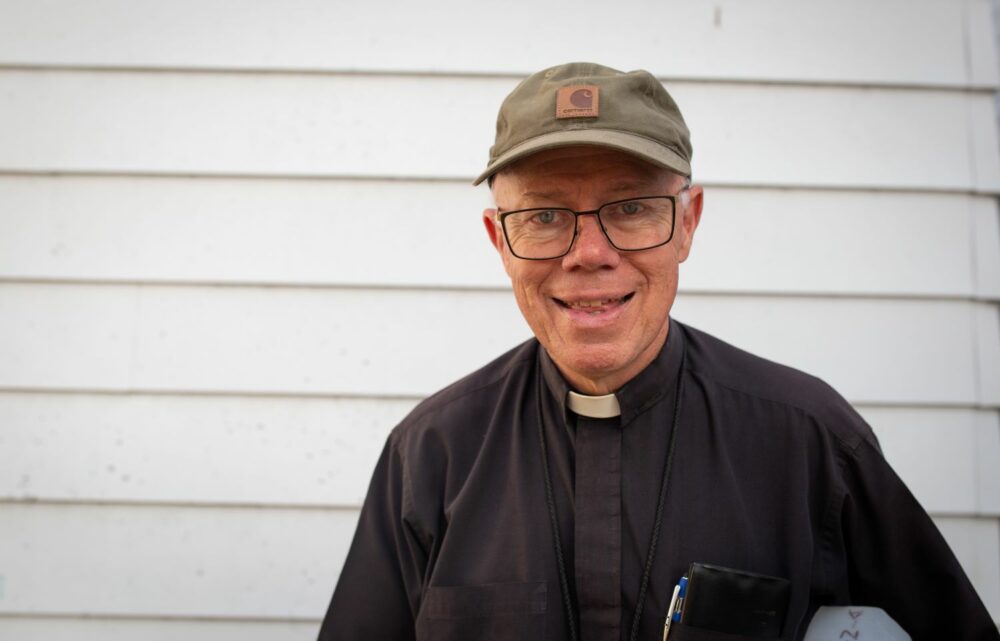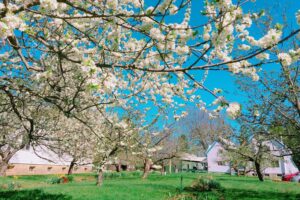
Fr. David May recently published his poetry in Tourist Out of Time: Fifty Poems from Fifty Years. Here he reflects here on writing poetry and his eponymous poem, Tourist Out of Time.
Why write poetry?
When some people ask that question, they really mean it!
Why write poetry at all? It’s not practical; it’s not clear and straightforward enough for a super busy generation. Get to the point, would you please? My seven-second attention span is about to expire!
Why write poetry? A prose essay is much simpler, clearer, logical! Okay, if you must, write a story, but a short story is usually preferable to a novel. On second thought, can you say it all in a tweet or two? Have you heard of Instagram?
Why write poetry? For one thing, certain kinds of experiences can be recorded better by poetry than by what one can do with prose.
Take, for instance, the transition from Lauds to breakfast on an average spring day in the Madonna House training centre in Combermere, Ontario.
One could report it this way:
Every weekday morning, the community gathers at Our Lady of the Woods chapel to pray morning prayer together. The prayers begin at precisely 8 a.m., and latecomers are barred from entry until after the selection from the Office of Readings is completed, as well as any information garnered by the person leading Lauds (known as the reader) about the saint of the day.
When prayers are finished, the group moves with some speed out of the chapel and across the causeway to the main house, where breakfast awaits them.
There is very little lingering in the chapel as one sometimes sees in monasteries. Rather, the “duty of the moment” is to get moving and to get to breakfast!
It is a beautiful, late-spring day, but that doesn’t stop anyone from moving with determination and purpose. They all know time is short, and precisely at 9 a.m. the little bell in the dining room is going to ring, signifying the end of the meal and the beginning of the workday.
One gets the feeling that the place is well-named: it is a “training centre.” One notes that the general atmosphere, however, is lighthearted and warm. This group is happy with how the day begins (with possible exceptions here and there) and eager to plunge into another day’s adventures.
The poet has a different view of things, calling himself a “Tourist Out of Time.”
Right away one notices a certain ambiguity, even in the title itself. Ambiguity, or richness of language? First, he is a tourist as opposed to being a pilgrim. Pilgrims, one presumes, are serious people. They travel with purpose: they have a definite goal in mind, and they have prayer intentions to drop off at the pilgrimage site.
Tourists, on the other hand, are out for recreational purposes or perhaps for a cultural experience. Definitely, the accent is on recreational as opposed to devotional.
This tourist is out of time.
That can mean a couple of things: either he lives on another plane than the usual one where we count time, or he’s getting old and soon will no longer be touring about at all. The poet is content to live in the ambiguity, because life itself is not so clearly defined.
There is a richness and a depth to reality, often hidden from our eyes but not from the eyes and ears of a poet who is alert on a given day.
In the poem itself (see poem), the writer first describes the movement with purpose of the young congregation. As in the prose version, they leave church and head to breakfast, where we learn they not only eat the meal but plan the work and assign vehicles for the day.
While all this is going on, in comparison, the poet is like a tourist. He has to take his time, for some reason. He describes how activity has slowed down in his life, and how racing around hurriedly no longer looks graceful, but silly.
Here, he is confronted with the choice: either to be bitter about getting older and being ill, or to find something positive in the experience. He decides that “it is better to reap benefits than harvest regrets.”
What are those benefits that someone walking slowly sees and that others, perhaps, miss? First there is the apple orchard. Some of the original trees are still there from 1947, the year Madonna House was founded. Therefore, in the poet’s imagination, these trees have witnessed, facing the main house as they do, many vigils of faith and struggles for hope, as well as sighs in the night.
But they have also seen the joy of apple blossom time, where white petals are flying everywhere like snowflakes.

The waxwing, a bird that loves to eat petals, is compared to a masked bandit since he sports a black “mask” around his eyes. The poet is playing with language here, as he describes these birds “stealing” from tree to tree – “stealing” being here another word for moving quickly and secretly, as well as helping oneself to something belonging to someone else.
But he also notices another bird, the pine siskin, who likes to travel in flocks and to chatter happily and, apparently, without great purpose other than the sheer joy of making noise together, or is it music or laughter?
Looking further upward, the poet notices vast movements of clouds on the winds, and in his imagination, it appears that they’re on a mission of some kind. He imagines himself one day also being carried to great heights by those mysterious winds that come and go as they please.
He arrives at breakfast, which is briefly described, and then the bell rings and breakfast ends. But in the meantime, outside, ospreys soar and then dive for prey in the great ocean air!
One might wonder why the poet was so taken up with events happening around him, events that happen quite commonly on spring days in Combermere. It seems he is aware of other purposes guiding events, different from the purpose we have determined for the day’s activities.
These other forces are vast and mysterious and beautiful and transcendent. They are going on no matter what we are up to, and we are part of them, part of something vast, and vastly beyond our control. I mean, these spaces and landscapes will continue to carry on long after you or I are dead and gone, or, out of time!
The poet searches for images rich in meaning and beautiful, rather than for concepts of specific meaning and precision. Yes, precision is another kind of beauty, one could say, but in poetry there is always a song, truth expressed as a song, since language itself has a musicality about it.
So maybe it’s another kind of precision the poet reaches for, after all. Hence, the playing with alliteration in certain places, or the adhering to a rhythmic pattern hidden underneath the words but carrying them along, even as a heart, though hidden, moves the blood along in the body.
Yes, a poem is a living organism in a certain sense, but who knows what makes a given poem come alive as true poetry? That is a mystery, and when it happens, it brings joy, and the conviction of truth, and the reality of beauty, and the hope for meaning to that most hidden of places, the human soul. In this sense, life without poetry is no life at all.




